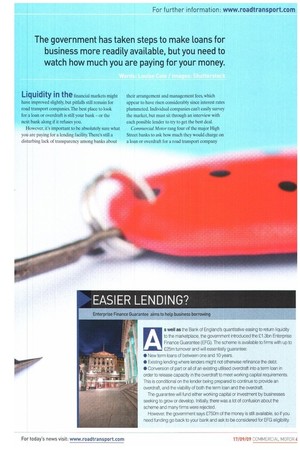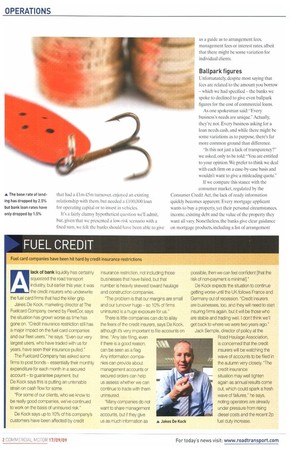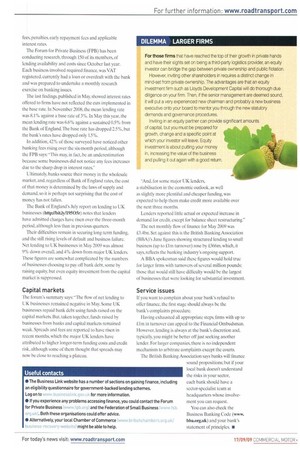The government has taken steps to make loans for business
Page 41

Page 42

Page 43

If you've noticed an error in this article please click here to report it so we can fix it.
more readily available, but you need to watch how much you are paying for your money.
Liquidity in the financial markets might e improved slightly, but pitfalls still remain for road transport companies. The best place to look for a loan or overdraft is still your bank — or the net bank along if it refuses you.
However, it's important to be absolutely sure what yoU are paying for a lending facility There's still a disturbing lack of transparency among banks about their arrangement and management fees, which appear to have risen considerably since interest rates plummeted. Individual companies can't easily survey the market, but must sit through an interview with each possible lender to try to get the best deal.
Commercial Motor rang four of the major High Street banks to ask how much they would charge on a loan or overdraft for a road transport company A The base rate of lending has dropped by 2.5% but bank loan rates have only dropped by 1.5%
that had a £1m-i5m turnover, enjoyed an existing relationship with them, but needed a £100,000 loan for operating capital or to invest in vehicles, It's a fairly clumsy hypothetical question we'll admit, but, given that we presented a low-risk scenario with a fixed sum, we felt the banks should have been able to give
us a guide as to arrangement fees, management fees or interest rates, albeit that there might be some variation for individual clients.
Ballpark figures
Unfortunately, despite most saying that fees are related to the amount you borrow which we had specified the banks we spoke to declined to give even ballpark figures for the cost of commercial loans.
As one spokesman said: "Every business's needs are unique." Actually, they're not. Every business asking for a loan needs cash, and while there might be some variations as to purpose, there's far more common ground than difference.
"is this not just a lack of transparency?" we asked, only to he told: "You are entitled to your opinion. We prefer to think we deal with each firm on a case-by-case basis and wouldn't want to give a misleading quote."
If we compare this stance with the consumer market, regulated by the Consumer Credit Act, the lack of ready information quickly becomes apparent. Every mortgage applicant wants to buy a property, yet their personal circumstances, income, existing debt and the value of the property they want all vary, Nonetheless, the banks give clear guidance on mortgage products, including a list of arrangement fees, penalties, early repayment fees and applicable interest rates.
The Forum for Private Business (FPB) has been conducting research, through 150 of its members, of lending availability and costs since October last year. Each business involved required finance. was VAT registered, currently had a loan or overdraft with the bank and was prepared to undertake a monthly research exercise on banking issues.
The last findings, published in May, showed interest rates offered to firms have not reflected the cuts implemented in the base rate. In November 2008, the mean lending rate was 8.1% against a base rate of 3%. In May this year, the mean lending rate was 6.6% against a sustained 0.5% from the Bank of England. The base rate has dropped 2.5%, but the bank's rates have dropped only 15%.
In addition, 42% of those surveyed have noticed other banking fees rising over the six-month period, although the FPB says: "This may, in fact, be an underestimation because some businesses did not notice any fees increases due to the sharp drop in interest rates."
Ultimately, banks source their money in the wholesale market, and, regardless of Bank of England rates, the cost of that money is determined by the laws of supply and demand, so it is perhaps not surprising that the cost of money has not fallen.
The Bank of England's July report on lending to UK businesses (http://bitly119505r) notes that lenders have admitted charges have risen over the three-month period, although less than in previous quarters.
Their difficulties remain in securing long-term funding, and the still rising levels of default and business failure. Net lending to UK businesses in May 2009 was almost 9% down overall, and 40/D down from major UK lenders. These figures are somewhat complicated by the numbers of businesses choosing to pay off bank debt, some by raising equity, but even equity investment from the capital market is suppressed.
Capital markets
The forum's summary says: "The flow of net lending to UK businesses remained negative in May Some UK businesses repaid bank debt using funds raised on the capital markets. But, taken together, funds raised by businesses from banks and capital markets remained weak. Spreads and fees are reported to have risen in recent months, which the major UK lenders have attributed to higher longer-term funding costs and credit risk, although some of them thought that spreads may now be close to reaching a plateau. "And, for some major UK lenders, a stabilisation in the economic outlook, as well as slightly more plentiful and cheaper funding, was expected to help them make credit more available over the next three months.
Lenders reported little actual or expected increase in demand for credit, except for balance sheet restructuring."
The net monthly flow of finance for May 2009 was £3.4bn. Set against this is the British Banking Association (BBA)'s June figures showing structured lending to small business (up to turnover) rose by £366m, which, it says, reflects the banking industry's ongoing support.
A BBA spokesman said these figures would hold true for larger firms with turnovers of several million pounds; those that would still have difficulty would be the largest of businesses that were looking for substantial investment.
Service issues issues
If you want to complain about your bank's refusal to offer finance, the first stage should always be the bank's complaints procedure.
Having exhausted all appropriate steps, firms with up to £1m in turnover can appeal to the Financial Ombudsman. However, lending is always at the bank's discretion and, typically, you might be better off just seeking another lender. For larger companies, there is no independent mechanism to arbitrate complaints except the courts.
The British Banking Association says banks will finance sound propositions; but if your local bank doesn't understand the risks in your sector, each bank should have a sector-specialist team at headquarters whose involvement you can request.
You can also check the Business Banking Code (www. bba.org.uk) and your bank's statement of principles. •








































































































































